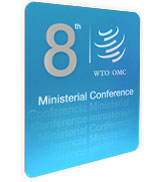Other WTO Ministerials:
> Geneva 30 Nov. - 2 Dec. 2009
> Hong Kong 13–18 Dec 2005
> Cancún 10–14 Sept. 2003
> Doha 9–14 Nov. 2001
> Seattle 30 Nov.–3 Dec. 1999
> Geneva 18 & 20 May 1998
> Singapore 9–13 Dec. 1996
Dear Friends
As nearly 150 Ministers from around the world gather here in Geneva, a tempest is gathering force on the horizon of the global economy.
Growth is slowing everywhere, which could lead to recession in some parts of the world. Rising debt levels and financial volatility are damaging business and consumer confidence. Unemployment is stubbornly high. Food security is a worry in many parts of the developing world. Global uncertainty and vulnerability are on the rise.
All of this is taking place against a backdrop of tectonic geopolitical shifts that have led to the emergence of new actors on the global stage and an increasing need to share power and responsibility as we seek collective answers to the problems weighing so heavily on governments today.
As I told Ministers in a letter I recently addressed to them, the WTO Ministerial Conference will be an occasion to chart the path of WTO work over the next two years. The path that can lead us to stronger multilateral cooperation, to develop improved global trade rules, resist protectionism and help our members return to growth, employment and development.
There is some positive news.
We will be welcoming four new members to the WTO at this Ministerial Conference: Russia, Montenegro and two small least-developed Pacific islands — Samoa and Vanuatu. The accession of these four, very diverse countries is a show of confidence in the organization.
WTO rules may be further improved and updated if members can strike a deal in the coming days to improve the terms and conditions of the Government Procurement Agreement. Such a deal would open government procurement markets to the tune of some $100 billion a year. An agreement could create a more competitive tendering environment, improve governance and reduce the strain on the public purse — a critically important consideration in this era of severe fiscal constraints. Although this would be a plurilateral agreement applicable only to a group of 42 members, the benefits would be tangible, particularly since such a deal is very likely to attract future signatories including China.
WTO members have also negotiated a package of measures which will be presented to Ministers for decision at the Ministerial Conference which, while modest, will be useful for our poorest members.
The WTO has also been successful in linking trade opening to trade capacity building through the Aid for Trade initiative. Aid for Trade has generated far more effective channels for financial assistance to developing countries with greater emphasis on projects being demand driven, closely monitored and efficiently implemented. During my consultations with Ministers this week, I will stress the critical need to focus on sustaining financing and showing results.
But many of the developments we confront are not at all good news.
We have not yet found a way to finish the Doha Development Round. At the heart of the impasse lie differences between advanced economies and emerging countries over what constitutes a fair distribution of rights and obligations within the trading system, among members with different levels of development.
The Ministerial Conference provides the right venue for Ministers to discuss concrete steps to exit the impasse in 2012.
This impasse is already taking its toll on the multilateral trading system. Delays in reaching a deal deprive the world economy of an insurance policy against protectionism which has been estimated at $800 billion. With the threat of protectionism growing, such an insurance policy has never looked so attractive.
We are encountering a period of great uncertainty and significant risk for the global economy. The WTO should continue to be a force for stability, predictability and transparency and provide an important platform from which to launch economic recovery. I believe we must all lift the level of our play if we are to deliver more of the global good that we provide to our member governments and the people they represent.
Best regards,
Pascal Lamy
Director-General
